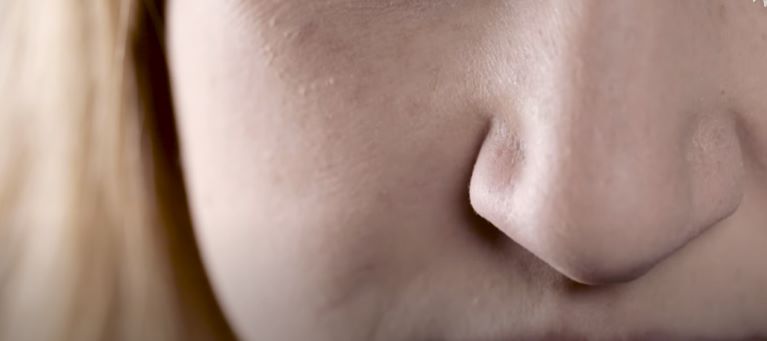If you’ve ever noticed a strange vinegar odor coming from your nose, you know how unpleasant it can be. You may have even taken a few days off work to go to the doctor and find out what’s going on. It could be a simple cold or flu, but it could also be more serious. In this post, I will share with you my experience on how to treat it and its causes. Keep reading to learn more in detail.
There are many reasons why people smell vinegar on their noses. It could be due to allergies, sinus infection, kidney disease, nasal polyps, tooth decay, drip postnatal, or even a cold. We will explain the causes of this phenomenon and tell you how to get rid of it.
Why Do I Smell Vinegar In My Nose?

Have you ever wondered why you smell vinegar in your nose? It’s a common occurrence and can be confusing to many people. Indeed, you may have this issue for a few different reasons. It can include:
Sinus infection
All types of sinus infections can fill your nose with an unpleasant odor; none of them are pleasant. Another word for a sinus infection is sinusitis, typically brought on by a virus or bacterium.
Fungi can also bring on sinus infections. Fungal infection might be moderate or quite dangerous in intensity. Compared to bacteria or viruses, fungi are more challenging for the body to develop an efficient immune response against.
Fungal infections may hamper immune performance. People with impaired immune systems are more likely to experience them frequently and seriously (have a disease that affects the immune function or is on chemotherapy or other drugs that reduce immune response).
Fungal sinusitis can occur in people who have long-term bacterial or viral sinusitis. Planning therapy requires understanding the underlying cause of your sinus infection. Chronic sinusitis, a sinus infection that persists for at least 12 weeks, is another possibility.
Kidney disease
Loss of kidney function is a gradual symptom of chronic kidney disease (CKD). Your kidneys perform several functions, one of which is to filter waste materials from your blood for elimination from the body through urine.
Waste products may accumulate in the body if the kidneys are not working correctly. You could detect an ammonia-like smell from those substances at the back of your nose. A metallic or ammonia-like taste on your tongue is also possible.
This progression often happens when CKD has reached stages 4 or 5. A fresh ammonia smell won’t likely be the first indicator of kidney disease at this time because you’ll probably also be experiencing other symptoms, including kidney pain, changes in urine color, and exhaustion.
Nasal polyps
Soft, noncancerous growths called nasal polyps can develop on the sinus or nasal cavity wall. These tiny growths, which resemble teardrops, develop due to ongoing inflammation. Your chance of getting nasal polyps rises if you have asthma, allergies, or recurring sinus infections.
An odor in your nose or a significantly diminished sense of taste and smell are potential or actual signs of nasal polyps. Since nasal polyps are frequently tiny, you might not even know their presence. Your respiration might not be impacted.
Nasal polyps often have an unpleasant odor, which may be brought on by fluid accumulation inside the polyps.
The mucous membrane’s wet lining produces the fluid, which also moisturizes your respiratory system and prevents dust and other foreign objects from getting into your lungs.
Drip postnasal
Postnasal drip is when your throat starts to leak with foul-smelling mucus. This can be painful, mainly if the mucus is thick and stretchy.
In addition to the pain, you could notice that the mucus has an unpleasant smell. Utilizing humidifiers and drinking lots of water might hasten to clear your airways.
dental decay
An accumulation of germs on a tooth can cause the surface to erode. This is dental caries. Both foul breath and an unpleasant odor may result from bacterial accumulation in your nose.
The best method to stop tooth decay and gum issues is to practice good oral hygiene, which involves brushing and flossing your teeth every day, as well as making regular dentist checkups.
How To Get Rid Of Bad Smell Like Vinegar In My Nose?

A foul smell in the nose is a common problem among people. Many of us have experienced this issue at one time or another. Therefore, knowing how to get rid of that nasty smell is essential. It will be revealed below.
Keep hydrated
Dehydration is often the underlying factor in disorders that create unpleasant nasal odors. A person’s daily liquid requirements are influenced by age, degree of exercise, food, and other factors.
People with insufficient saliva production might use artificial saliva or try sugar-free sweets or gums to stimulate salivation.
Some foods, such as fiber-rich fruits and vegetables, require a lot of chewing, which might encourage salivation.
Maintain proper dental hygiene
Several disorders that lead to an unpleasant odor in the mouth and nose can be treated with appropriate dental hygiene. Several suggestions are:
- Twice daily, brush your teeth for 2 minutes using fluoride-based toothpaste.
- Always floss.
- Use a toothbrush or tongue scraper to brush the tongue regularly.
- Every day, clean your dental tools and dentures.
- After meals, chew sugarless gum for five minutes.
- Reduce your intake of dehydrating meals and beverages like alcohol and coffee.
- Stop using tobacco and smoking.
- Periodic cleanings and examinations of your teeth.
Try making your own saltwater rinse
An unpleasant odor in the nose might be momentarily lessened by using a saltwater rinse.
Making a saltwater rinse at home involves:
- Water needs to be heated until it boils, then allowed to cool.
- While the water is still fairly warm, combine 1 teaspoon (tsp) of salt and 1 teaspoon (tsp) of baking soda.
- With soap and water, thoroughly wash your hands.
- Pour some of the mixtures into the cupped palm of one hand while squatting over a sink or basin.
- Sniff a little of the mixture into each nostril individually, then let it drip out of your nose while you lean over the sink. Using a finger to keep the other nostril closed while sniffing could be beneficial.
- Go through steps 4 & 5 several times.
A soft rubber ear bulb syringe and over-the-counter nasal saline rinse products are further options.
Apply over-the-counter medications
Some over-the-counter (OTC) medicines may also assist in treating disorders that lead to unpleasant nasal odors. OTC drugs consist of:
Spray for congested nasal passages: This can facilitate sinus drainage and reduce irritated nasal passages. The majority of nasal decongestant sprays work for 3–4 days.
Antihistamines: Reducing inflammation can aid in clearing blocked sinus and nasal passageways.
Sneeze Smells Like Vinegar: The Causes & Measures

It may sound strange, but sneezing can smell like vinegar. Some health problems cause this odor. Just scroll down and discover.
Reasons why sneeze smell
According to Dr. Del Signore, sneezing is a rapid ejection of air caused by an allergen or irritation in the nasal canal. These irritants are typically allergies, environmental contaminants, or microorganisms like viruses. In other words, substances that your body wants to eliminate.
According to Dr. Del Signore, the aroma of your sneeze is often caused by these ejected particles. As a result, if you breathe in pollen after sneezing, it probably enters your nose accidentally.
Dr. Del Signore says that your sneeze’s aroma might resemble the scent of your breath.
How to solve
The first thing to do is to take a look at your diet. Are you eating foods that are high in acid? Foods like tomatoes, citrus fruits, and vinegar can all cause your sneeze to smell like vinegar. If you’re eating many of these foods, try to cut back and see if the problem goes away.
If you think you might have sinusitis, see your doctor and get it checked out. They can help you figure out what’s causing the problem and give you the best treatment options.
Should You Be Worried If Your Snot Smells Like Vinegar?
There is a lot of debate about whether you should be worried if your snot smells like vinegar. Some people believe that the smell indicates a health problem, while others say it’s simply a natural body odor and doesn’t mean anything.
In most cases, the vinegar-like smell is because you have a cold or sinus infection. The mucus in your nose is full of bacteria, and when it gets mixed with vinegar, it can produce a pungent smell. However, there are some cases where the vinegar-like smell can be a sign of a more serious medical condition, such as a sinus tumor or a bacterial infection. If you’re concerned about the odor, it’s best to see a doctor to get checked out.
FAQs
Will the vinegar smell go away on its own?
It can be unpleasant and have an impact on how things taste when your sense of smell changes. However, it usually isn’t significant and will likely go away in a few weeks.
Can the vinegar smell be prevented?
Making lifestyle adjustments can help lower the likelihood of getting a foul odor in the nose, depending on the disease. Lifestyle changes include:
– Avoiding dehydrating meals and beverages like coffee and alcohol
– Use decongestants or antihistamines to treat nose or sinus irritation, avoiding foods and beverages that make your mouth smell awful, such as garlic and onions.
– Not using tobacco products or smoking
– Bringing up the possibility of lowering or switching drugs that might cause dry mouth with a doctor
– Undergoing routine dental examinations and treating oral or dental infections
What should I do if the vinegar smell in my nose persists?
You should ask a doctor to check up as soon as possible.
Reference:

I’m Renee L. Bazile, and I’m passionate about health and fitness. Keeping fit and active has always been a passion of mine.
I graduated from Nova Southeastern University with a degree in Exercise Science. I believe being healthy and fit is the key to a happy and successful life.
Over the past ten years, I have trained more than 10.000 clients in the fitness industry. My goal is to help others achieve their fitness goals. The saying goes, “If you don’t use it, you lose it.” Therefore, we all need to exercise regularly to maintain health and fitness.
In 2019, I became an expert on health & fitness topics for ThisIsGuernsey after starting my blog about health & fitness. I relax and rebalance my life by walking, fishing, and blogging in my free time.
